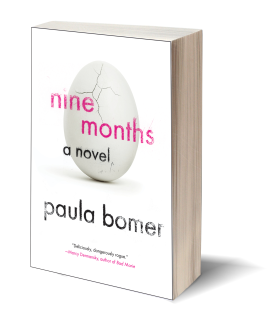Nine MonthsBy Paula Bomer
Soho Press |
 |
|---|
Reviewed by Tom Williams
Nine Months, the title of Paula Bomer's first novel, is also the title of a 1995 romantic comedy starring Hugh Grant, Julianne Moore, and none other than Mr. Tom Arnold. And while this reviewer is in no way trying to draw any comparisons between the two—they are as different as Mark Twain's lightning and lightning bug—both the novel and the movie demonstrate the inherent danger of dealing with a subject like pregnancy. You might start out with the best intentions but end up, as in the movie, waxing morally and worse, uninterestingly, about the chaos that conception can bring.
But if there are fears that Bomer has traveled the same sentimental route as the filmmakers, worry not. Any reader remotely familiar with her first book, Baby and Other Stories, will recall wincing at her all too real rendering of the here and now that troubles women and men. And in Nine Months, with a simple but significant structural tweak, Bomer sets the reader on a path that steers far from soapy melodrama. The present tense opening scene of the first chapter (dated "February 7") focuses vividly on the moments after Sonia, the novel's central character, delivers a child. It's a gambit, for what's at stake is the loss of suspense, yet Bomer handsomely pulls it off. In Chapter One, we don't know that the pregnancy was unplanned, that Sonia is an urban mom in her thirties, already mother to two rowdy boys and dealing with a distant husband (all too tellingly named Dick), or that the artistic yearnings she's harbored are reawakening. We only know Sonia is "in awe of her daughter, in awe and also, not so oddly, rather unmoved by her." How she got to Philadelphia to deliver this child, though, is another story.
After the first chapter, Bomer pivots to "June—Eight Months Earlier" in Chapter Two and narrates forward. And it is in these subsequent chapters that Bomer and Nine Months are freed from the typical suspense questions of the unexpected pregnancy plot: Will she terminate the pregnancy? Will it bring her and Dick closer? Will the child have health issues? Bomer is also able to enhance the book further by providing glimpses into the world of Sonia's affluent Brooklyn mom-friends, balancing that with an arresting portrait of Sonia's uncertain marriage and the relentless pace of rearing sons. Meanwhile, she does all this while plumbing the depths of Sonia, who scene-by-scene defies the reader to sympathize and identify with her. This is not to say that Sonia isn't likeable—that ridiculous assessment that one hopes Claire Messud's justified anger has rendered unusable as a character description. Instead, it's to say that Bomer has created in Sonia a character whose consistency and credibility startles again and again. In a way, we're not surprised by what Sonia thinks, says, or does; we're surprised that she does what she thinks and says.
Again, though, the creation of such a riveting character is no surprise if you've read Bomer's previous fiction. In Baby and Other Stories, what struck me as so singular was Bomer's willingness to stay in the head of a character, especially one on the verge of or carrying out something that might not be in her best interests overall. In Nine Months, when Sonia determines that she must leave her relatively comfortable surroundings, Bomer writes, "And then she thinks, it doesn't matter. I'm going, I'm gone, I'm doing what every mother dreams of doing because I've always followed my dreams. I'm doing what every mother fears she'll do, because I've always confronted my fears. I'm doing something really terrible and I'll be punished for it, no doubt, but I've always been a trouble maker."
And she does it. She drives away in her Passat, going north to Boston, where she once studied art and hung out with rock bands, then west to her native South Bend, Indiana, and back again. Whereas the first half of the novel can seem cramped in terms of setting and plot, the road trip in the second half opens up Sonia to other opportunities, all of which she seizes, and all of which might worry us about the health of the baby she's carrying were it not for the work done by the opening chapter. The question is not whether fucking a stranger or drinking too much or driving with one of the worst cases of hemorrhoids in American Literature will hurt the baby. The real question is what will bring Sonia to that hospital in Philadelphia to deliver her daughter.
Bomer provides an answer to that question but the reader should be allowed the joy of discovering it in this terrific novel. And while the book is not without flaws—some dialogue sounds forced, especially that between Sonia and her friend Clara, who seems, as Henry James would have it, more the reader's friend than Sonia's—Nine Months does (forgive the pun) deliver in so many ways. Bomer's prose is so lucid, her voice so sure, that despite all the emotional upheaval this novel charts, the reader feels secure, sensing throughout that there is no other way this story could be told and no other writer who could tell it so well.
